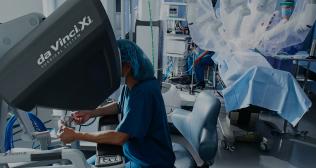
Best General Surgery Hospital in Mumbai
Best General Surgery Hospital in Mumbai
When you need surgery, whether elective or emergency, you want a highly competent surgeon who can perform the procedure with precision and accuracy, state-of-the-art facilities, and a caring staff who will explain the details and make sure all your concerns are addressed. Fortis Hospital, Mulund, one of the best general surgery hospitals in India, provides safe and innovative procedures for a wide range of conditions, including those requiring complex surgeries. Our general surgeons offer the latest surgical techniques, such as minimally invasive and robotic procedures, ensuring the best possible outcomes for patients.
Why Choose Fortis Hospital, Mulund, for General Surgery?
Every year, thousands of patients seek surgical treatment at Fortis Hospital, Mulund, from routine outpatient operations to the most complex procedures that involve several surgical specialities, to avail high-quality care and services. Our outstanding services include:
- Expert surgeons – our highly experienced surgeons possess extensive and specialised expertise in numerous surgical procedures.
- Advanced procedures – we lead in surgical innovations and equipment, including minimally invasive and robotic surgery, offering patients several benefits, such as reduced pain after surgery and quicker recovery times.
- Integrated, personalised care – our surgeons work closely with other professionals in other surgical and medical specialities to ensure a comprehensive and tailored plan for each patient.
This article talks about what general surgery is, who general surgeons are and what they treat, common procedures and the types of surgical techniques used by these specialists, and when you should consult a general surgeon.
What is General Surgery?
General surgery is a medical specialty that focuses on diagnosing and treating a variety of conditions, using surgical procedures. It covers several areas, such as the gastrointestinal system, endocrine system, breasts, circulatory system, and traumatic injuries. It is a broad and demanding field that requires a diverse set of skills and the ability to manage different medical issues, including emergencies and complex cases.
Who is a General Surgeon?
A general surgeon is a medical doctor who has specialised training and expertise in various surgical procedures. Unlike specialists who focus on a specific body system like the brain (neurosurgeons) or bones (orthopaedic surgeons), general surgeons can treat an array of conditions involving almost any area of the body. They have a deep knowledge of anatomy, physiology, metabolism, immunology, pathology, wound healing, and other areas common to all surgical specialties.
General surgeons are skilled in performing both routine and complex surgical procedures. They play an integral part in a healthcare team, from the initial evaluation through preparation, procedure, and post-operative care, including the management of complications.
What Conditions or Body Systems do General Surgeons Treat?
General surgeons are trained to operate on various parts of the body, including the digestive tract, the abdomen and its contents, the head and neck, blood vessels and heart, the endocrine system (hormones and glands), the skin and soft tissues, including the breasts. They are often involved in the care of critically ill patients requiring complex surgeries.
Some of the common conditions they treat include:
- Appendicitis
- Bowel obstructions
- Breast cancer
- Colon cancer
- Endocrine issues – such as thyroid disorders, adrenaline gland tumours, parathyroid gland disorders
- Fissure
- Fistula
- Gallbladder disease
- Haemorrhoids
- Hernia
- Liver disease
- Upper gastrointestinal (GI) diseases, including gastroesophageal reflux disease (GERD), gastritis, peptic ulcers, and certain types of esophageal and stomach cancers
- Pancreatitis
- Rectal prolapse
- Soft tissue diseases
- Traumatic injuries
- Ulcerative colitis
- Vascular conditions
- Critical illness
What Types of Surgical Procedures and Techniques do General Surgeons Use?
General surgeons perform a wide range of surgical procedures for conditions that cannot be managed with medications and non-invasive treatments.
Surgical Procedures
Some of the most common procedures include:
- Appendectomy – removal of the appendix
- Anti-reflux surgery (Nissen fundoplication) – a procedure to treat GERD
- Bariatric surgery or weight loss surgery
- Breast surgery – to treat tumours in the breasts or change the appearance of the breasts
- Cholecystectomy – to remove the gallbladder to treat gallstones or other gallbladder problems
- Exploratory surgery (laparotomy or laparoscopy) – to investigate the cause of abdominal pain
- Hernia repair surgery
- Hysterectomy – to remove the uterus and sometimes other structures like the cervix to treat certain conditions, including uterine or ovarian cancer
- Liver resection or hepatectomy – to remove part or all of the liver to treat liver disease, including cancer
- Pancreas surgery – to treat conditions like pancreatitis or pancreatic cancer
- Prostatectomy – removal of all or part of the prostate gland to treat prostate cancer or benign prostatic hyperplasia
- Splenectomy – removal of the spleen to treat a ruptured spleen, infection, a blood disorder, or certain cancers
Surgical Methods
General surgeons employ different surgical techniques, encompassing both traditional open surgery and minimally invasive methods - depending on the type of procedure required. Perhaps, with advances in technology, surgeons today undergo extensive training to master a full range of state-of-the-art surgical methods.
Open surgery – the surgeon makes a larger cut through the skin and tissues to have a full view and treat the organs or structures involved.
Minimally invasive surgeries include:
- Laparoscopic surgery – your surgeon inserts a laparoscope, a long, thin tube with a camera, through a small incision to view the organs on a screen. This method allows your surgeon to remove diseased organs or repair tissue with less pain and a quicker recovery.
- Robotic surgery – in this surgical technique, your surgeon controls robotic arms connected to a computer console and the patient. It offers several benefits, such as increased precision, smaller incisions, and faster healing.
- Endoscopy – your surgeon inserts an endoscope, a small, flexible tube with a light and camera at the end, into your throat (upper endoscopy) or anus (colonoscopy) until it reaches the target area. This method enables doctors to diagnose or treat many conditions without cutting through your skin or tissues.
The adoption of less invasive procedures has led to a range of positive outcomes for patients, like less pain, shorter hospital stays, faster recovery times, and a lower risk of complications compared to conventional open surgery.
At Fortis Hospital, Mulund, our specialists will conduct a thorough evaluation of your condition to determine if surgery is the right option for you. If surgery is recommended, our experts will discuss the best surgical approach for you for safety and optimal results. Our general surgeons lead the way in robotic surgery and other advanced surgical technologies, enhancing patient care and quality of life.
When Should You See a General Surgeon?
Generally, patients are referred to a general surgeon after being diagnosed with a medical condition that needs surgical intervention. General surgeons are often the ‘go-to’ specialists for emergency surgeries. You may also see a general surgeon when you have a chronic or lingering health issue that does not respond to non-surgical forms of treatment.
Here are some health conditions that often require surgery:
- Appendicitis
- Cancer
- Chronic back pain
- Female reproductive disorders affecting the uterus, cervix, ovaries and other related organs
- Gallstones
- Hernias
- Haemorrhoids or other rectal conditions
- Gastrointestinal issues, such as bowel obstruction
- Traumatic injuries
Additionally, some common signs that indicate you might need surgery include:
- Chronic pain
- Severe abdominal pain
- Difficulty breathing
- Blood in urine or stool
- Persistent fever
- Recurring infections
- Unexplained weight loss
- Unexplained lumps or growths
- Wounds that do not heal
Seek immediate medical help if you’re experiencing any of these signs or symptoms that concern you. Timely medical intervention, whether surgical procedures or non-surgical treatments, can help prevent complications and improve outcomes.
Conclusion
General surgery is a broad and evolving medical speciality that encompasses a wide range of surgical procedures to diagnose and treat various diseases and injuries throughout the body. It comprises a set of highly specific subspecialties, each demanding many years of intensive training to develop expertise. Surgeons in this field perform surgeries on various body systems, following established techniques and best practices to ensure safety and optimal patient care. They are the ones who perform life-saving surgical procedures in emergencies, such as severe wounds or a burst appendix.
From life-threatening emergencies to planned procedures, you can expect all the surgical facilities from general surgeons. They are adept at utilising the latest surgical techniques like laparoscopy, robotic surgery, and other less invasive methods, offering several advantages compared to traditional open surgery.
If you’re dealing with a medical condition that isn’t responding to non-surgical treatments and need world-class surgical care, the expert surgeons at Fortis Hospital, Mulund, are here to help.
Categories
Clear allMeet the doctor

- General Surgery | General Surgery
-
15 Years
-
1300



















